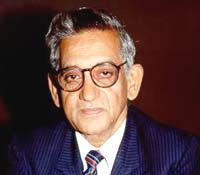
Ramakanta Rath is one of the most renowned modernist poets in the Odia literature. Heavily influenced by the poets such as T. S. Eliot and Ezra Pound, Rath experimented greatly with form and style. The quest for the mystical, the riddles of life and death, the inner solitude of individual selves, and subservience to material needs and carnal desires are among this philosopher-poet's favorite themes. His poetry betrays a sense of pessimism along with counter-aesthetics, and he steadfastly refuses to put on the garb of a preacher of goodness and absolute beauty. His poetry is full of melancholy and laments the inevitability of death and the resultant feeling of futility. The poetic expressions found in his creations carry a distinct sign of symbolic annotations to spiritual and metaphysical contents of life. Often transcending beyond ordinary human capabilities, the poet reaches the higher territories of sharp intellectualism. The contents have varied from a modernist interpretation of ancient Sanskrit literature protagonist Radha in the poem "Sri Radha" to the ever-present and enthralling death-consciousness espoused in "Saptama Ritu".

Ghulam Mohammed Sheikh is a painter, poet and art critic from Gujarat, India. He was awarded the Padma Shri in 1983 and Padmabhushan in 2014 for his contribution in field of art.
The Saraswati Samman is an annual award for outstanding prose or poetry literary works in any of the 22 languages of India listed in Schedule VIII of the Constitution of India. It is named after the Hindu goddess of knowledge, Saraswati.

Gunvant Shah is an essayist, educationist, columnist and philosophy writer and critic from Gujarat, India. He taught at various universities and participated in various education oriented events and organisations. His large number of essays, including philosophical essays, are published as books. He received Ranjitram Suvarna Chandrak in 1997 and Padma Shri, the fourth highest civilian award of India, in 2015. In 2019, he was awarded a D.Lit. by Gujarat University.
Manubhai Pancholi also known by his pen name Darshak, was a Gujarati language novelist, author, educationist and politician from Gujarat, India. He participated in the Indian independence movement and held several offices after independence.
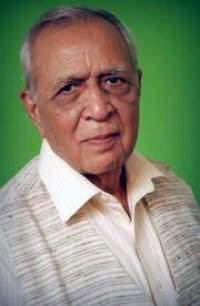
Bholabhai Patel was an Indian Gujarati author. He taught numerous languages at Gujarat University and did comparative studies of literature in different languages. He translated extensively and wrote essays and travelogues. He was awarded the Padma Shri in 2008.

Chandrakant Amritlal Topiwala is a Gujarati language poet and critic from Gujarat, India.

Bhagwatikumar Sharma was an Indian author and journalist who wrote in Gujarati. Born in Surat and educated in languages, he edited a daily for several years. He wrote novels, short stories, poetry, essays and criticism. He received Ranjitram Suvarna Chandrak in 1984 and Sahitya Akademi Award in 1988.

Jayanti Ghelabhai Dalal was an Indian author, publisher, stage actor, director and politician. Born in family of theatre organiser and involved in politics during and after independence of India, he was influenced by socialism and Gandhian philosophy. He wrote one-act plays, short stories and edited publications.

Labhshankar Jadavji Thakar, also known by his pen names Lagharo and Vaidya Punarvasu, was a Gujarati poet, playwright and story writer from India. Educated in languages and Ayurveda, he taught at colleges before starting practice of Ayurveda. He had a modernist approach in literature and was heavily influenced by absurd theatre and the traditions of experimental literature. He chiefly wrote plays and poetry.
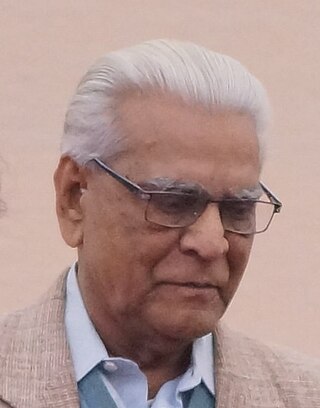
Dhiru Ishwarlal Parikh was an Indian Gujarati poet, short story writer and critic. He was an editor of Kavilok and Kumar, Gujarati literary magazines.
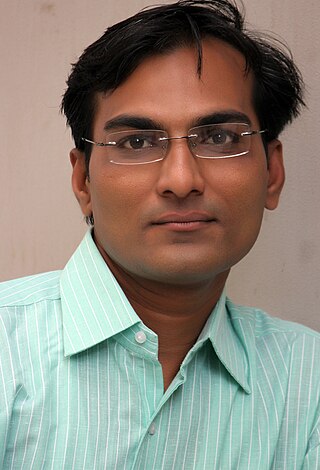
Ashok Chavda, also known by his pen name Bedil, is a Gujarati poet, writer and critic from Gujarat, India. His anthology of poetry, Dalkhi Thi Saav Chhutan (2012), was awarded the Yuva Puraskar by the Sahitya Akademi in 2013. His collection of known writings include Pagla Talaavma (2003), Pagarav Talaavma (2012), Tu Kahu Ke Tame (2012), Pityo Ashko (2012), Shabdoday (2012), and Ghazalistan (2012), which is a translation of Urdu ghazals written by Indian and Pakistani poets. He is also a recipient of the Yuva Gaurav Award (2012) from the Gujarat Sahitya Akademi, and the Dasi Jivan Award (2013–14) from the Government of Gujarat. He has appeared in several TV and radio programs on All India Radio and Doordarshan.

Vinod Joshi is an Indian poet, writer and literary critic in Gujarati language from Gujarat, India. His notable works include Parantu, a collection of Geet, Shikhandi, a long narrative poem based on Shikhandi, a character from the Mahābhārata, Radio Natak: Swarup ane Siddhant, Tundil-tundika, a form of padyavarta, a Gujarati medieval literary genre, and Zalar Vage Zoothadi, a collection of poems. He is the recipient of the Jayant Pathak Puraskar (1985), Critic's award (1986), Kavishwar Dalpatram Award (2013), Sahitya Gaurav Puraskar (2015), Narsinh Mehta Award (2018), Kalapi Award (2018), Darshak Sahitya Sanman Award (2021), Narmad Suvarna Chandrak (2022) and Sahitya Akademi Award (2023).

Jatayu is a Gujarati poetry collection by Sitanshu Yashaschandra published in 1986. It is a collection of surrealistic poems based on Indian mythology, romantic temper, modern consciousness, and nature. It won the Sahitya Akademi Award in 1987.
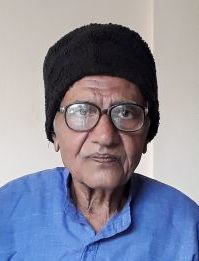
Harikrishna Pathak is a Gujarati poet, short story writer, editor and children's writer from Gujarat, India.

Manilal Haridas Patel is a Gujarati poet, essayist, novelist, and literary critic from Gujarat, India. He has won numerous awards for his work, including the 2007 Dhanji Kanji Gandhi Suvarna Chandrak literary medal for his significant contributions to Gujarati literature.
Yashwant Trivedi was an Indian Gujarati poet, essayist and critic.
Ravindra Parekh is a Gujarati short story writer, novelist, playwright, poet, critic and translator from Gujarat, India.

Mahesh Champaklal is an Indian dramatist, stage actor and director from Gujarat, India. After working for some years in the commercial Gujarati theatre, he joined and taught dramatics at the Maharaja Sayajirao University of Baroda.

Vasdev Mohi is a Sindhi poet, translator, critic, short story writer and a retired lecturer. He also served as the member of the executive board of Sahitya Akademi and member of Council for Promotion of Indian Languages, collectively from 2008 to 2013. His work include twenty-five books of poetry, uncertain translation and critic works. The recipient of numerous awards, including Saraswati Samman for his short story book titled Chequebook published in 2012, some of his uncertain critical essays have appeared in literary festivals held in national and international seminars.



















